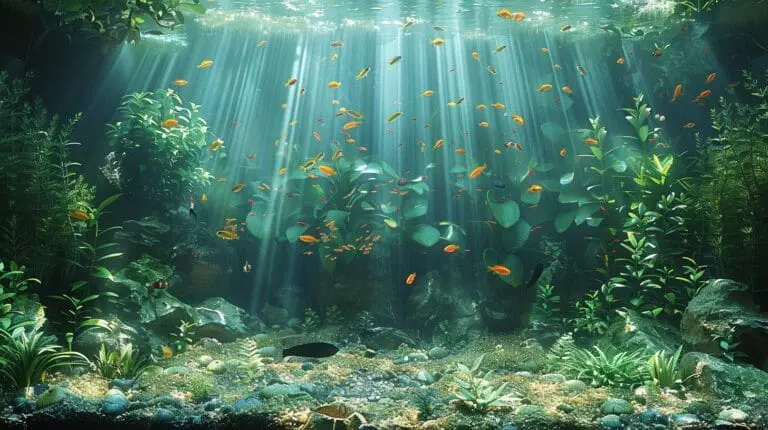Can sharks live in lakes? This question sparks curiosity among aquarium hobbyists. Most sharks thrive in saltwater, but some species adapt to freshwater environments. Bull sharks, for example, can swim up to 60 miles upstream in warm rivers. 2 Their unique ability to regulate salt levels allows them to survive in both ocean and river habitats. 1
As an experienced aquarist, I’ve watched how sharks act in different kinds of water. Knowing where sharks live is important for keeping a healthy fish tank. Sharks in lakes are still a surprise to many people.
Let’s explore the truth about freshwater sharks and their potential to inhabit lakes. 3
Key Takeaways
- Most sharks can’t live in lakes, but bull sharks can swim in freshwater for short times.
- Bull sharks have been found up to 2,400 miles inland in rivers like the Amazon.
- The Great Lakes are too cold and fresh for sharks to survive.
- Climate change is pushing some sharks into new habitats, including freshwater areas.
- Conservation efforts are important to protect bull sharks, which are listed as vulnerable by the IUCN.
Understanding Shark Habitats: Can Sharks Thrive in Freshwater Lakes?

You might think sharks only live in oceans. But some sharks can swim in freshwater lakes too. Let’s explore how these sea creatures adapt to lake life.
Adaptability of Sharks: How Some Species Manage in Freshwater
Sharks are tough creatures, known for their aggressive nature. Some can live in freshwater. Bull sharks particularly stand out here. They can swim in rivers and lakes for long times. Their bodies work hard to keep the right salt balance.
These sharks pee a lot more in fresh water – up to 20 times more! This helps them stay healthy in different waters. 1
“Bull sharks are the ultimate adaptors of the shark world.”
Seven types of sharks can live in fresh water. The Ganges shark is one of them. It lives only in rivers. These sharks have special gills and kidneys. The parts help them deal with less salt.
In your tank, you won’t find these big guys. But their skills show how amazing fish can be at changing to new homes.
Global Cases of Freshwater Sharks: From Australia to New Guinea
Freshwater sharks exist in various parts of the world. You’ll find these rare creatures in unexpected places.
- Australia’s Northern Territory hosts the speartooth shark in rivers and estuaries.
- Papua New Guinea’s Lake Jamoer contains a small bull shark population.
- Lake Nicaragua in Central America has a semi-permanent bull shark group.
- Venezuela’s Lake Maracaibo supports bull sharks due to its brackish water.
- The Ganges River in India houses the Ganges shark, a true freshwater species.
- Bull sharks swim up to 700 miles in the Mississippi River. 2
- The Amazon River sees bull sharks travel over 2,400 miles upstream.
- Lake Pontchartrain in Louisiana has occasional bull shark visitors.
- The Zambezi River in Africa hosts bull sharks, also known as Zambezi sharks.
- Guatemala’s Lake Izabal contains a small bull shark population.
The Bull Shark: An Exception to the Saltwater Rule
Bull sharks break the rules. These tough fish can live in both salt and fresh water. Their special bodies let them swim in rivers and lakes. Bull sharks grow up to 11.5 feet long and weigh 500 pounds. 1 They use their gills, liver, and kidneys to balance salt in their bodies. This skill helps them move between oceans and rivers easily.
You might spot a bull shark far from the sea. They’ve been seen in rivers hundreds of miles inland. These sharks can stay in fresh water for long periods. Female bull sharks even give birth to 1 to 13 pups in rivers. 1 Their ability to adapt makes them unique among sharks.
The Great Lakes Shark Myth: Separating Fact from Fiction

You’ve heard stories about sharks in the Great Lakes. But these accounts aren’t accurate. Here’s why sharks can’t live in these lakes.
Historical Shark Claims in the Great Lakes Region
Have you ever heard of sharks swimming in lakes? It might sound strange, but people have been talking about shark sightings in the Great Lakes for a very long time! Let’s look into these stories and see if they’re true.
- 1930s: First reports of bull sharks in Lake Michigan surfaced3
- Fishermen claimed to spot large, shark-like creatures near shorelines
- 1955: A fisherman in Alton, Illinois reported catching a bull shark
- Local newspapers spread stories of shark attacks, causing public panic
- 1960s: Increased sightings led to “shark hunts” in Lake Michigan
- No concrete evidence or photos emerged from these expeditions
- 1975: A supposed 5-foot shark carcass was found on a Lake Superior beach
- Experts later identified it as a sturgeon, not a shark
- 1980s-1990s: Occasional reports of shark fins seen in Lake Erie
- Scientists dismissed these as misidentified native fish species
- 2003: A hoax photo of a shark in Lake Michigan went viral online
- The image was later proven to be digitally altered
- 2010: A YouTube video claimed to show a Great White in Lake Huron
- Marine biologists quickly debunked it as a staged prank
Now, let’s examine the ecological barriers preventing sharks from thriving in the Great Lakes.
Ecological Barriers to Shark Survival in the Great Lakes
Despite past claims, the Great Lakes pose major hurdles for sharks. You’ll find these barriers make shark survival nearly impossible. The lakes’ cold waters clash with sharks’ warm-water needs. Bull sharks, for example, thrive in temps above 75°F. Yet, Great Lakes average only 40 to 70°F. 3
Salt levels also block sharks from calling the lakes home. Most sharks can’t handle freshwater for long. Their bodies need salt to work right. The Great Lakes lack this crucial element.
Plus, physical obstacles like locks and dams stop sharks from swimming in. These factors create a tough spot for any shark trying to live there.
Investigating the Great Lakes Ecosystem: Why It’s Unsuitable for Sharks
The Great Lakes lack the right conditions for sharks. These freshwater bodies don’t have enough salt for most shark species. Sharks need saltwater to keep their bodies working well.
The lakes also get too cold in winter. Most sharks can’t handle freezing temperatures. They’d struggle to survive the harsh winters. 4
Food is another big issue. The Great Lakes don’t have the variety of prey sharks need. Sharks are top predators and need lots of fish to eat. The lakes don’t offer enough food to keep sharks healthy.
Without the right salt levels, temperature, and food, sharks just can’t make the Great Lakes their home.
The Great White Misconception: Why Lakes Are Not a Home

Great whites need salty oceans to live. Lakes don’t have the right water for them. Want to know why? Keep reading!
The Biological Needs of Great White Sharks: Ocean vs. Lake Environments
Great white sharks need salty oceans to live. Their bodies work best in water with lots of salt. Lakes don’t have enough salt for them. These big fish grow up to 21 feet long and weigh 4,500 pounds.
They like oceans that are 12 to 24 degrees Celsius. Their bodies have special ways to deal with salt water. Lakes are too different for them to survive. 5
Oceans give great whites what they need. They have space to swim and hunt. Lakes are too small and don’t have the right food. The water in lakes is also too fresh. Great whites can’t control the salt in their bodies in fresh water. This makes lakes a bad home for these huge sharks.
Great White Sharks and Temperature Sensitivity: The Lake Challenge
Great white sharks need salty, cool ocean water to survive. Lakes are too warm and fresh for them. Their bodies can’t handle the change.
You won’t see great whites in your local lake. They’re built for the sea. Their special gills and organs work best in salt water. Lakes don’t have the right food or space for these huge predators either.
Stick to smaller fish for your home aquarium – great whites are ocean-only creatures! 6
Bull Sharks in Rivers: Paving the Path to Lakes?

Bull sharks can swim up rivers, making them unique among sharks. These tough fish adapt to fresh water and travel far inland. Some have been spotted over 2,000 miles from the ocean! Want to know more about how these sharks conquer rivers and maybe even lakes? Keep reading….
Understanding Bull Shark Migration: How Rivers Serve as Passageways
Bull sharks amaze with their ability to swim in fresh water. These tough fish can live in rivers for long periods. They’ve been spotted 2,400 miles up the Amazon River! 2 Rivers act as highways for bull sharks to move inland. They use these paths to find food and breeding spots.
You might wonder how they survive in fresh water. Bull sharks have special glands that help them keep salt in their bodies. This lets them stay in rivers for months. In Lake Nicaragua, a group of bull sharks even lives there year-round. 2 This shows how well they adapt to different water types. 7
Analyzing the Adaptability of Bull Sharks in River Systems
Bull sharks show amazing skills in rivers. They can live in both salt and fresh water. Their special glands help them keep the right salt levels in their body. You’ll find these tough fish in many rivers around the world. They swim up to 2,500 miles inland in some cases!8
Young bull sharks often stay in rivers for safety. They grow there for up to five years before moving to the ocean. This helps them avoid big predators. In Australia, some bull sharks even got stuck in a golf course lake after floods. They lived there for years! This proves how well these sharks can adapt to new places.
Documented Cases of Bull Sharks in Inland Waters: Unraveling the Phenomenon
Bull sharks have shown a remarkable ability to swim far inland. Here are some documented cases of these sharks in freshwater:
- Matawan Creek, New Jersey: In 1916, a bull shark swam 27 kilometers up this river. It attacked three people, killing two. 9
- Mississippi River: Bull sharks have been spotted over 1,000 miles upstream from the Gulf of Mexico. They’ve reached as far north as Illinois.
- Lake Nicaragua: This large freshwater lake in Central America has a resident bull shark population. They enter through the San Juan River.
- Brisbane River, Australia: Bull sharks live year-round in this river. They’ve been seen up to 80 kilometers inland.
- Zambezi River, Africa: Also called river sharks, bull sharks swim up this river. They’ve been found as far as 1,100 miles from the ocean.
- Lake Pontchartrain, Louisiana: This brackish lake connects to the Gulf of Mexico. Bull sharks often enter it to give birth.
- Ganges River, India: Bull sharks have been seen over 100 kilometers upstream in this sacred river.
- Fitzroy River, Australia: In 2018, researchers found juvenile bull sharks living 100 kilometers inland in this river.
- Breede River, South Africa: A 3-meter bull shark was caught 5.5 kilometers upstream in this river in 2012.
- Amazon River: Bull sharks have been found over 2,400 miles up this massive river system. They can adapt to the low salinity.
Sharks and Freshwater Lakes: A Glimpse into Future Possibilities

Climate change might reshape shark habitats in surprising ways. Scientists are finding sharks in new places, hinting at a future where these fish adapt to fresh waters.
Climate Change and Its Impact on Shark Habitats
Sharks face big changes as oceans warm up. You’ll see them moving to new places as their homes shift. In U.S. waters, many fish – sharks included – are swimming north to cooler spots. This affects where you might spot different shark species in the future. 10
These shifts can mess up food chains and breeding grounds. Sharks may end up in areas they’re not used to. This could lead to conflicts with humans or other sea life. As an aquarium fan, you might notice changes in what kinds of sharks are available or suitable for tanks.
Scientific Discoveries: Sharks in Unconventional Environments
Climate change pushes sharks into new habitats. Scientists now find these predators in surprising places. 11 Recent studies show bull sharks swimming up rivers and lakes. 11 These tough fish can live in both salt and fresh water.
Scientists found bull sharks swimming in Lake Bayano, Panama. This lake is really far from the ocean, about 700 miles away! People who love fish tanks and sharks are very surprised. It shows that sharks can learn to live in fresh water, even when they’re used to living in the ocean.
You might wonder how these ocean dwellers survive in lakes. Bull sharks have special glands that help them keep salt in their bodies. This lets them stay in fresh water for long periods.
Some have been found as far as 2,400 miles up the Amazon River. For aquarium hobbyists, this shows how adaptable fish can be. 12 It’s a reminder that fish often surprise us with their abilities to thrive in new settings. 12
Conservation Efforts and Human Impact: Balancing the Ecosystem
You play a key role in shark conservation. As an aquarium hobbyist, you can help protect these amazing creatures. Bull sharks face many threats today. Fishing, habitat loss, and climate change put them at risk. The IUCN lists bull sharks as vulnerable. This means they need our help to survive. 2
Your actions matter. By learning about sharks, you spread awareness. You can support groups that work to save sharks. You might even join beach clean-ups to protect their homes. Every small step counts. Together, we can keep bull sharks swimming for years to come.
Conclusion
Sharks rarely live in lakes. Bull sharks can swim in freshwater for short times. They adapt to rivers but not lakes. Most sharks need salt water to survive. Lakes lack the right conditions for sharks to thrive long-term.
Keep exploring the amazing world of aquatic life in your tanks!
FAQs
1. Can sharks live in lakes?
Most sharks can’t live in lakes. But a few can… for a bit. Bull sharks are tough. They can swim in fresh water for weeks. Some even go up rivers! Bull sharks have a special trick for surviving in freshwater environments. Their kidneys can adjust to the lower salinity levels, allowing them to maintain the proper balance of water and salts in their bodies. This unique ability sets them apart from other sharks and allows them to venture into lakes and rivers when necessary. It’s like they have their own built-in system for underwater fish breathing, which is a rare and impressive adaptation in the animal kingdom.
2. Are there any true freshwater sharks?
Yes, but they’re rare. River sharks live in fresh water all the time. They’re found in Asia and Australia. These fish are small and not like ocean sharks.
3. How do some sharks survive in fresh water?
Special sharks, like bull sharks, have a cool trick. They can change how salty they are inside. This helps them live in both salt and fresh water. It’s pretty neat!
4. Are lake sharks dangerous to humans?
Most lake sharks aren’t big or mean. But bull sharks can be. They might bite if they feel scared. Still, attacks in lakes are very rare. Don’t worry too much!
5. What’s the biggest lake a shark has been seen in?
Lake Nicaragua is huge – it’s like a little sea. Bull sharks have been spotted there. They swim up from the ocean through rivers. It’s quite a trip for them!
6. Can sharks live in cold lake water?
Most sharks like warm water. But some, like the Greenland shark, love the cold. They could live in cold lakes… if they could get there. But that’s hard for them to do.
References
- ^ https://apexpredators.com/how-do-bull-sharks-survive-in-fresh-water/
- ^ https://www.ifaw.org/animals/bull-sharks
- ^ https://www.oceanactionhub.org/bull-sharks-in-the-great-lakes/
- ^ https://doubleactiondivecharters.com/bull-sharks-and-the-great-lakes-unraveling-the-mystery/
- ^ https://www.oceanactionhub.org/can-great-white-sharks-survive-in-freshwater/
- ^ https://greatlakesecho.org/2015/07/23/great-whites-in-the-great-lakes-bull-shark/ (2015-07-23)
- ^ https://www.bassresource.com/bass-fishing-forums/topic/193895-yes-there-are-bull-sharks-in-rivers/ (2017-07-29)
- ^ https://www.forbes.com/sites/melissacristinamarquez/2023/09/06/bull-sharks-remarkable-adaptation-to-landlocked-life-revealed/
- ^ https://spearfishing.world/thread/966-bull-shark-freshwater-shark/
- ^ https://www.fisheries.noaa.gov/feature-story/effects-climate-change-sharks (2021-07-26)
- ^ https://www.boundless-pursuit.com/post/sharks-in-fresh-water (2023-05-15)
- ^ https://a-z-animals.com/animals/shark/shark-facts/shark-infested-lakes/ (2024-06-25)






